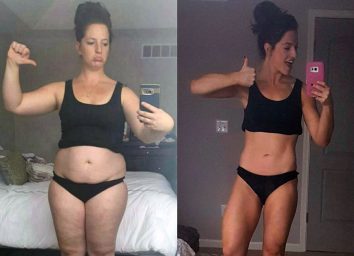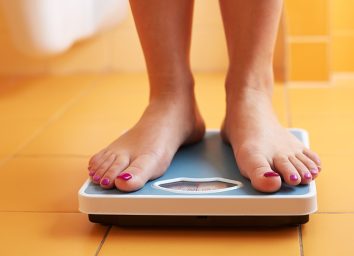39 Ways to Turn Off the Chatter in Your Head About Food

Have you found yourself snacking more than normally lately? Can’t stop thinking about food? Take heart, even nutritionists say it’s normal. As you sit home for long periods of time and learn how to navigate the stresses of what’s going on in the world, or even need a breather from your new work-from-home lifestyle, it’s normal to want to gear your attention towards something else. “Your brain needs breaks from concentration,” says Dr. Rachel Paul, PhD, RD from CollegeNutritionist.com. “It’s normal to switch your focus.”
And yes, it’s normal to immediately switch your attention to food. Especially in stressful times.
“Using food to cope with emotions such as boredom is a normal part of the common human experience,” says Crystal Cascio, RDN and Health Coach for the Anticancer Lifestyle Program. “With that being said, when we’re constantly using food to cope with boredom is when we can experience negative impacts on our overall health and well-being.”
But here’s the deal—you have the power to quiet those negative thoughts. Once you learn to rewire your brain and recognize your triggers, those blaring thoughts will simmer down to a whisper and eventually completely disappear so you can stay on track and make decisions about food that you can feel good about. Thanks to a few pointers from nutritionists and online health coaches, here are some easy ways to switch your focus and how to stop thinking about food.
Take a walk
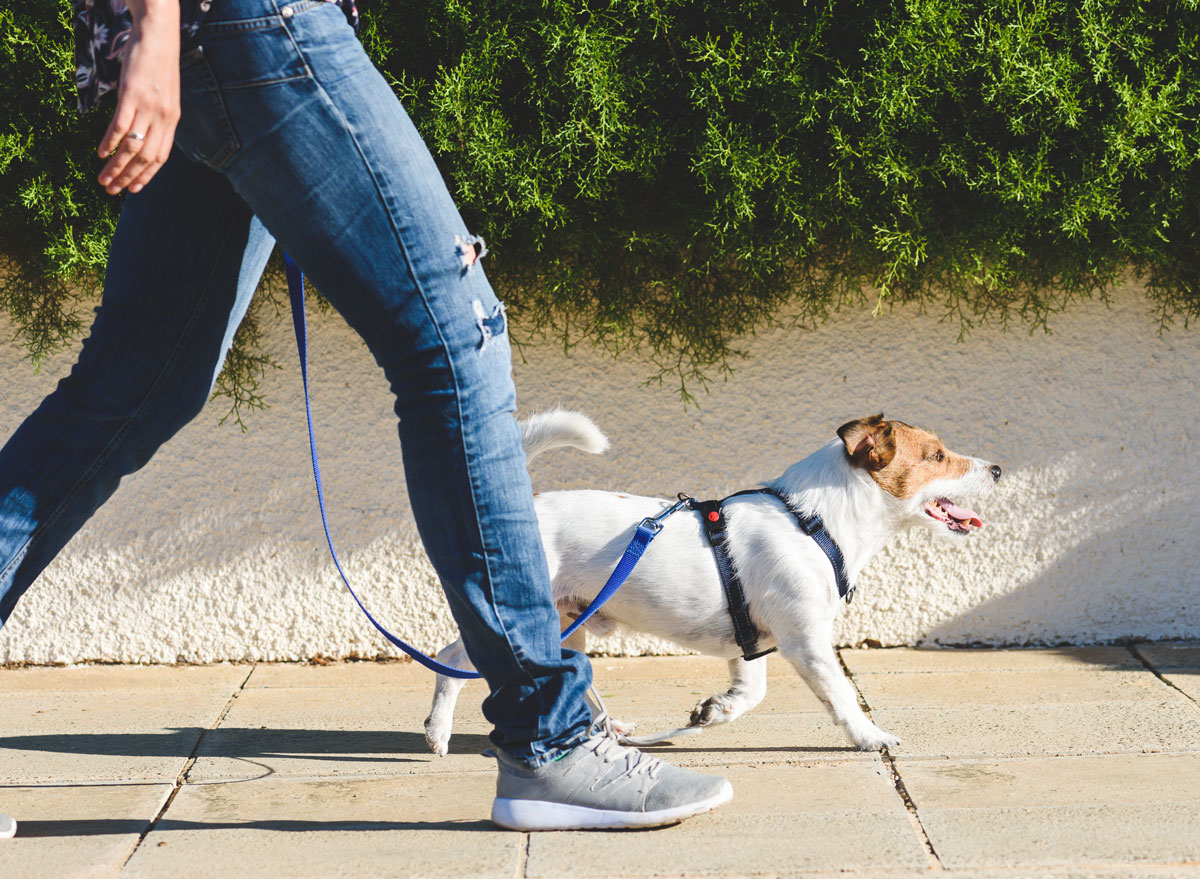
Get out of the kitchen and go outside for a walk (or a jog) and get your mind refocused on something besides food. “Exercise has also been associated with reduced food cravings,” says Josh York, founder and CEO of GYMGUYZ. “Perceived hunger may stem from boredom, so going for a walk or jog can help distract and entertain the mind.”
“Sometimes all your body is craving is a little movement,” says Katie Boyd, Nutritionist, M.S. “When I get the belly growls I lace up my sneakers and go for a twenty-minute walk and when I come back in the house the hunger has totally subsided.”
Sit by a window and read a book

Sometimes a change of scenery can help your mindset, especially when you’re next to a window. Dr. Paul recommends finding a window that is cozy for you and read that book you’ve always wanted to read.
Listen to a podcast

Are there a few podcasts your friends have recommended that you haven’t had the time to listen to yet? Take advantage of the time you have and put one of those on! Your mind will drift as it listens and you’ll immediately stop thinking about food.
Call a friend, parent, or sibling

Give them a call! Before those negative thoughts get any louder, pick up the phone and call someone you trust. This is a great time to catch up with those you love. Give them a call! Take a bubble bath, or do a face mask.
“Just giving yourself that time to show appreciation for your physical vessel can really do wonders for shifting your mindset off the snacking,” says Boyd.
Meditate

To stop negative internal dialogue and the feelings of anxiety that come along with it, pick a spot on the wall to stare at. And then follow clinical hypnotist Margo Drucker‘s instructions: “Loosen your jaw and let your tongue relax,” she says. “Slowly begin to expand your peripheral vision to include all the space around the spot. Then, expand your vision out to the sides, up to the ceiling and down to the floor. Always keeping your eyes on that spot. Expand it even more, so much so that you can imagine becoming aware of the space behind you. This will immediately put a stop to that internal chatter or anxious feeling. The beautiful thing about it is that it can be done anywhere, anytime. You can even use the forehead of the person you’re talking to as your focal point. It’s that simple.”
Get really good at doing something fancy

Want to get better at painting your nails? Trimming your beard? Maybe even coordinating a few new outfits with the clothes you already have? Always wanted to try a new hairdo, but never had the time to do it? Take some time to “get fancy” for yourself. The project in itself will capture your concentration and help you to stop thinking about food.
Go through your fridge
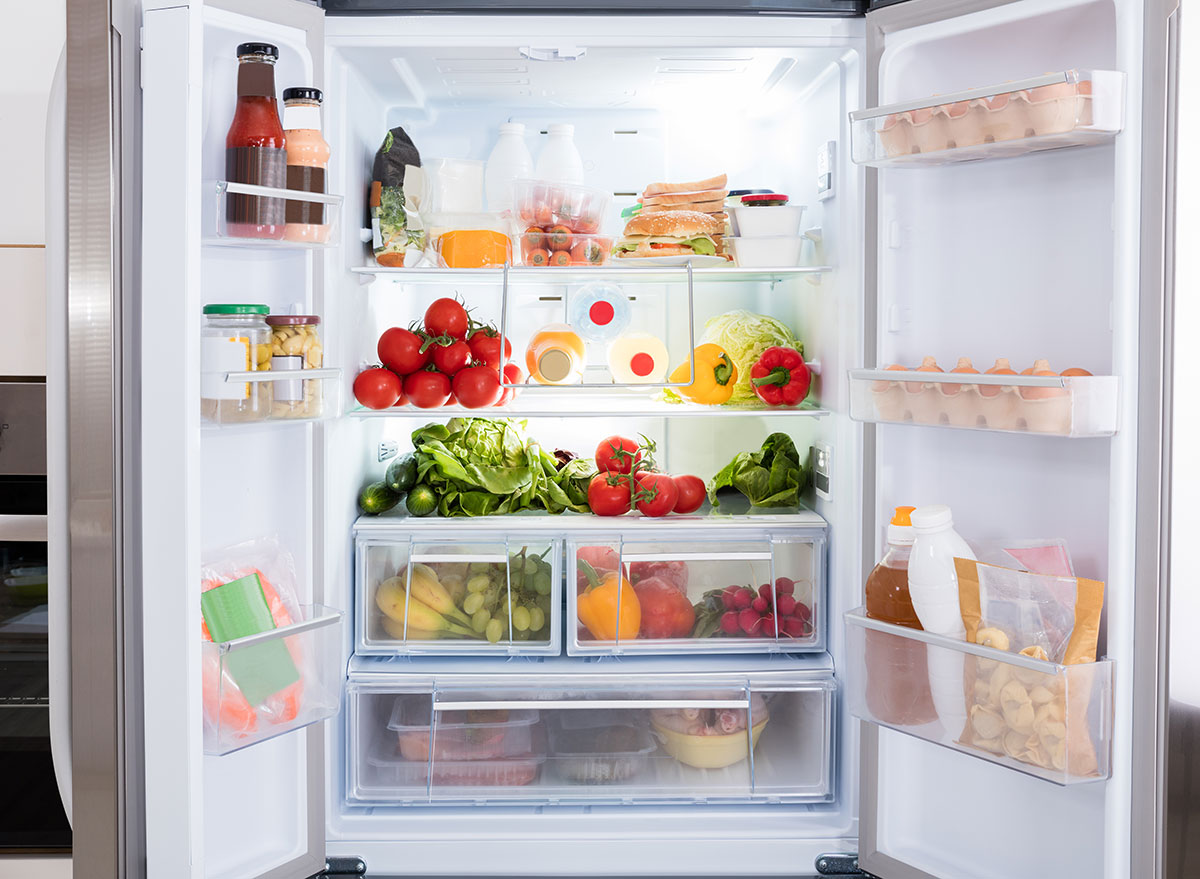
Take some time to go through your fridge and get rid of any of the food that’s going bad. Dr. Paul recommends once a week is a good time to do so. “When your fridge is too full it’s actually easier to let food go to waste.”
Reorganize a room in your house

Is your container cabinet giving you anxiety? Today’s the day to fix that. Organize whatever part of your home is making you anxious to relieve any extra tension you’ve been holding on to.
Do a puzzle or board game
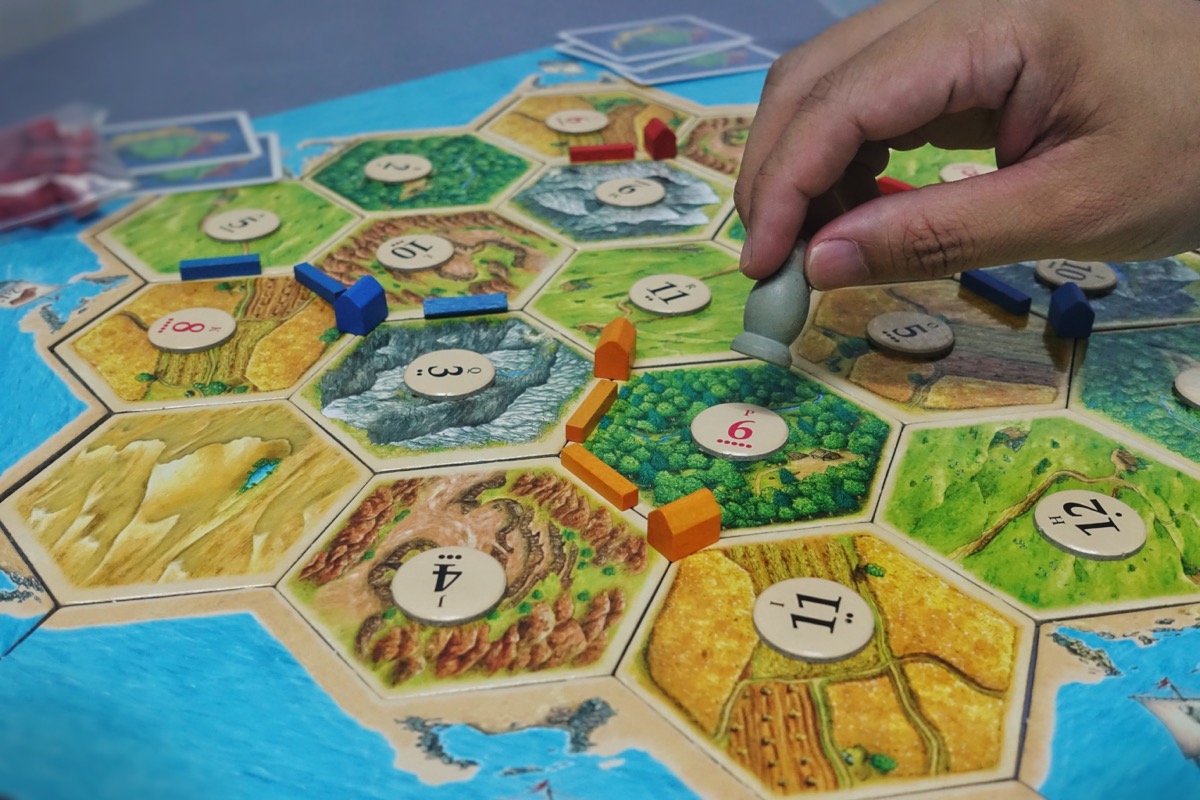
While it may sound traditional, doing a puzzle is an easy way to pass the time, and can silence your mind so you can stop thinking about food. And if you’re stuck at home with others, play some of your favorite board games.
Have a game night
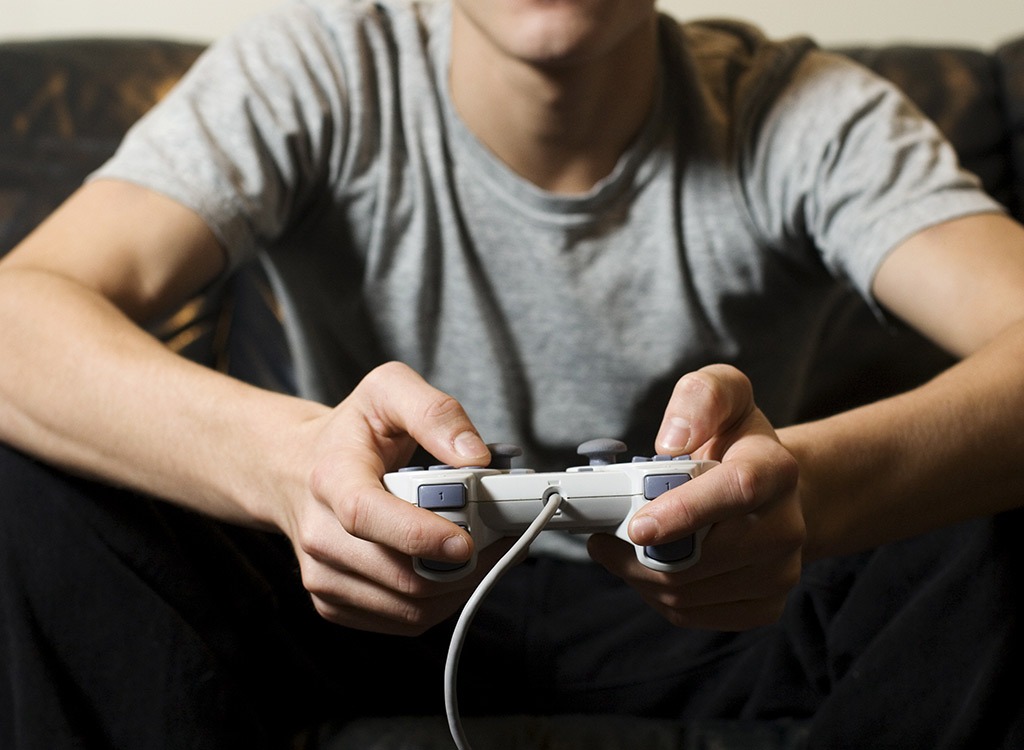
You don’t have to just play games in your home by yourself, invite others to join you! Host a virtual game night where each person will have to move your pieces in the same places on their end to create a virtual “board” that you share together.
Update your resume

Been meaning to update that resume of yours? Ignore the snack stash and get it done! You’re going to feel massively productive and accomplished when it’s finished.
Take an online course

Learn a new skill with the slew of courses available online! Have you thought about upping your social media game? Dr. Paul actually teaches a course for Instagram and TikTok! Or you could even take her nutrition course.
Clean up your emails

If you have an inbox that is completely overwhelming you, clean it up. It will certainly distract you from food as you zap those emails into the trash.
Journal

Journaling is an easy way to switch your focus that Dr. Paul recommends. The best part about journaling? Your journal can be whatever you want it to be. Rant about your anxiety? Document your day? Make a picture book, or even draw something? The sky is the limit.
Start a “kitchen garden”

Always wanted to have a few bushes of fresh herbs in your window sill? Now’s the time to try planting them! Here’s how to start an indoor herb garden in your home.
Do a workout

“Not only are you burning some of those extra calories you are probably consuming, but by staying active, your mind isn’t idle, so less opportunity for a bored mind to convince you you’re hungry when you’re not,” says Susan E. Wilson, RDN, LDN. “Also, regular physical activity helps reduce stress, anxiety, and depression and I think many people could probably use that right now.”
Portion out your snacks and set a time to enjoy them
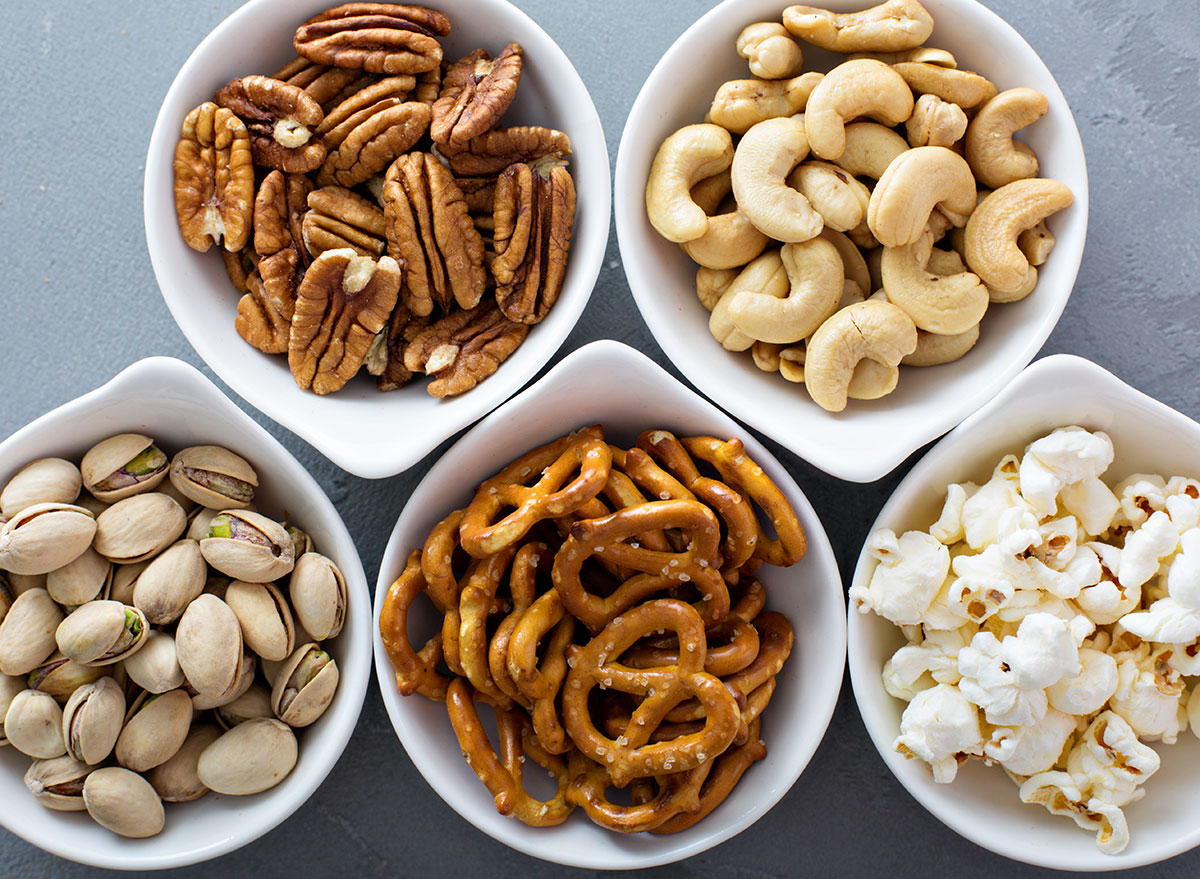
It’s okay to want a snack, and if you want to have one in your day, you should! An easy way to avoid eating mindlessly is portioning out your snacks into smaller bags or containers, and then choosing the time of day you’ll want that snack the most.
“I noticed that if I put things in bags based on their serving size, so if I have pretzels or cheez-it’s that I enjoy, I put them in bags in their individual serving size that way I know I should only have that serving size,” says Brianne Munch, a certified personal trainer, online coach, and author of the e-book B-Fit: The Ultimate Macro Tracking Guide.
Send a voice memo to a friend

“Taking time to help lift someone up right now by sending them a nice text or even make it more personal by sending a voice message will put you in a state of love and gratitude,” says Boyd. “Plus, the law of reciprocity will work out in the end. Help someone feel good and you, in turn, will feel good.”
Breathe

“Sometimes we are so low on oxygen from feeling stress and holding our breath or shallow-breathing that it can make us tired and therefore trigger what I like to call the ‘hungry horrors’,” says Boyd. “Taking 20 deep breaths filling up your lungs through your nose and then releasing the air through your mouth will help hyper-oxygenate your body perking you up and shifting your focus from food to the next task at hand.”
Stay hydrated

“By drinking fluids throughout the day, you’re keeping your belly just a bit more full, so fewer feelings of hunger,” says Wilson. “Also, dehydration can also come across as feelings of hunger, therefore causing you to grab that snack. If you’re feeling hungry, but you ate not long ago, try drinking a glass of water.”
If you feel like you’re not drinking enough water throughout the day, you can easily calculate how many ounces you need by dividing your body weight in half.
Work on maintaining a sleep cycle

“Sleep is often an overlooked aspect of health,” says Wilson. “Poor sleep habits can affect so much. It can have a negative impact on food, it can disrupt the hormones which control feelings of hunger and satiety, it can weaken the immune system, can reduce motivation for physical activity, and honestly, I could go on. Lack of sleep can independently be a factor in weight gain. Chronic stress and anxiety can also contribute to weight gain, and lack of sleep can promote this. Try to make sure you are still going to bed and waking up around the same time daily.”
Clean out your social media feed

Are there accounts you are following on Facebook, Instagram, or Twitter that are giving you anxiety, or don’t bring you joy any more? Time to unfollow them! Go through the accounts you follow and clean out the ones that are no longer life-giving out.
Try a new recipe
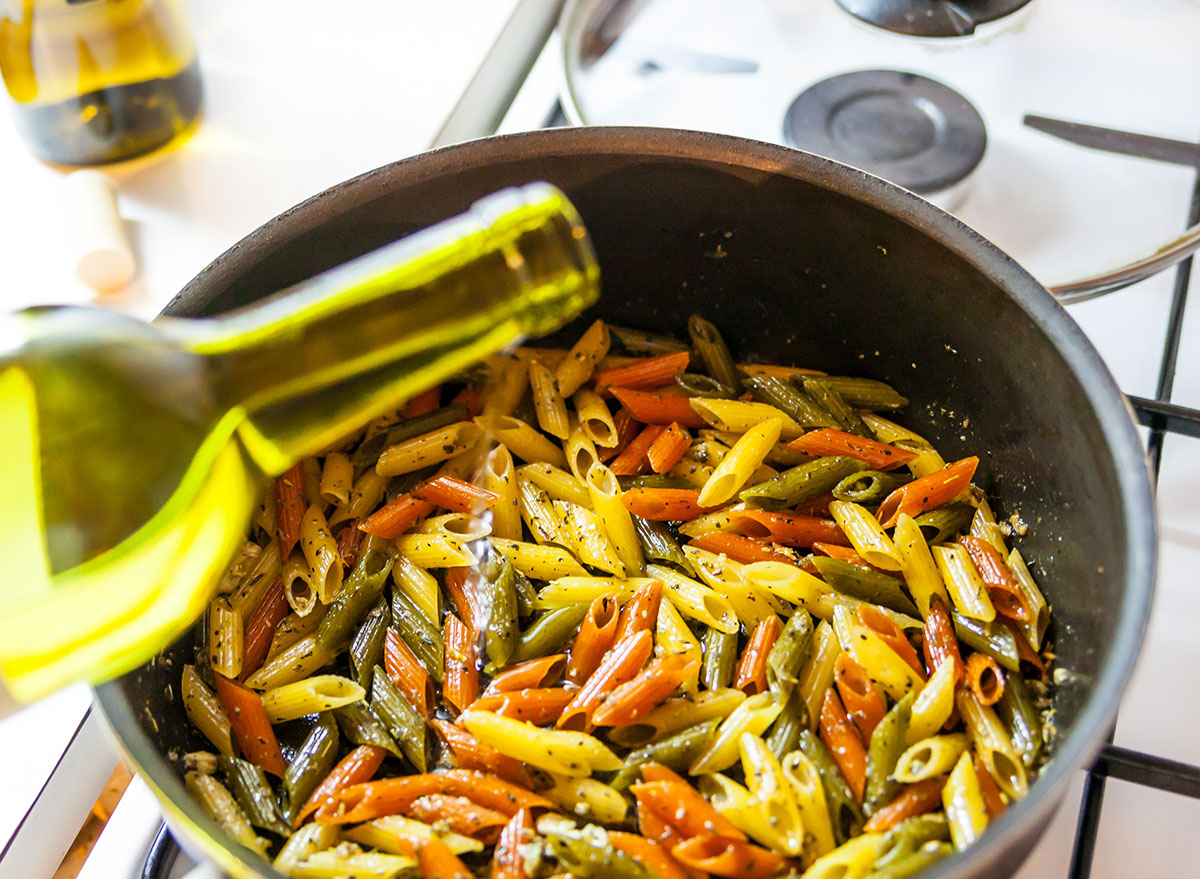
If you find that you really are hungry and it’s time for a meal, don’t just snack on something that isn’t substantial. Challenge yourself to cook a new healthy recipe, like one of our 100 best healthy recipes, and sit down to enjoy a healthy meal.
Have sex

When your cravings are controlling you, grab your spouse, significant other, or friend-with-benefits and get busy! “It sounds odd, but sex boosts dopamine and serotonin and will occupy your brain for 20 minutes—the time you need to readjust your thinking pattern and release all those feel-good chemicals into your body in lieu of the bad foods,” says Dr. Estes. If you’re not really in the mood, then get some inspiration from these best foods to increase your sex drive.
Take down the voices in your head

“Close your eyes and listen to the voice for a moment,” says Drucker. “What direction is it coming from? Hear it from the opposite side. Hear it from way off in the distance. Hear it in a different voice like Minnie Mouse. Play it a few times in that new voice—slow, fast, then five times slower than before. Open your eyes. Try to hear it again. Notice how it’s different?”
Yell and clap it out

Combining physical actions with loud verbal cues can quite literally tell those negative voices to scram. “When trying to turn off the ‘chatter’ in your head about food, combine loud positive verbal messages with physical reinforcement,” says Derek Mikulski, BS, CSCS, CPT and founder of ActivMotion®. “This can be something as simple as clapping your hands hard while at the same time yelling, ‘Stop!’ out loud. The noise of your voice combined with the physical contact between your hands and the stern message will engage different decision-making areas of your brain and help turn off that chatter!”
Replace your unhealthy foods

Truth be told, if you don’t have sugar and refined foods at your disposal, then it’s a lot harder to give into your cravings. “Getting rid of sugar gets rid of cravings for sweets and carbs because—let’s be honest—that little voice in your head is not calling for grilled salmon and veggies!” says Jacqui Justice, MS, CNS, Nutrition Director at NY Health and Wellness. “Replacing nutrient-deficient food with nutrient-dense food like lean, clean protein, antioxidant and fiber-rich veggies and low-sugar fruits and good fats will help to balance your hunger hormones and take your mind off food —especially mindless snacking, which is generally the biggest issue.”
Think about how you’ll feel later

If you were to make the bad choice your brain is so forcefully encouraging, imagine yourself three or four hours later. “Ask yourself how would you’ll feel physically, mentally, and physiologically,” says Monica Auslander, MS, RDN, Registered Dietician and founder of Essence Nutrition. “Ask yourself how your energy levels will change. Do you think you’ll be satisfied? If you skip your workout, how will you feel later or tomorrow?” Taking the time to think through a bad decision before you act on it—and imagine its impact—will help you from ever even going there.
Add more fats to your diet
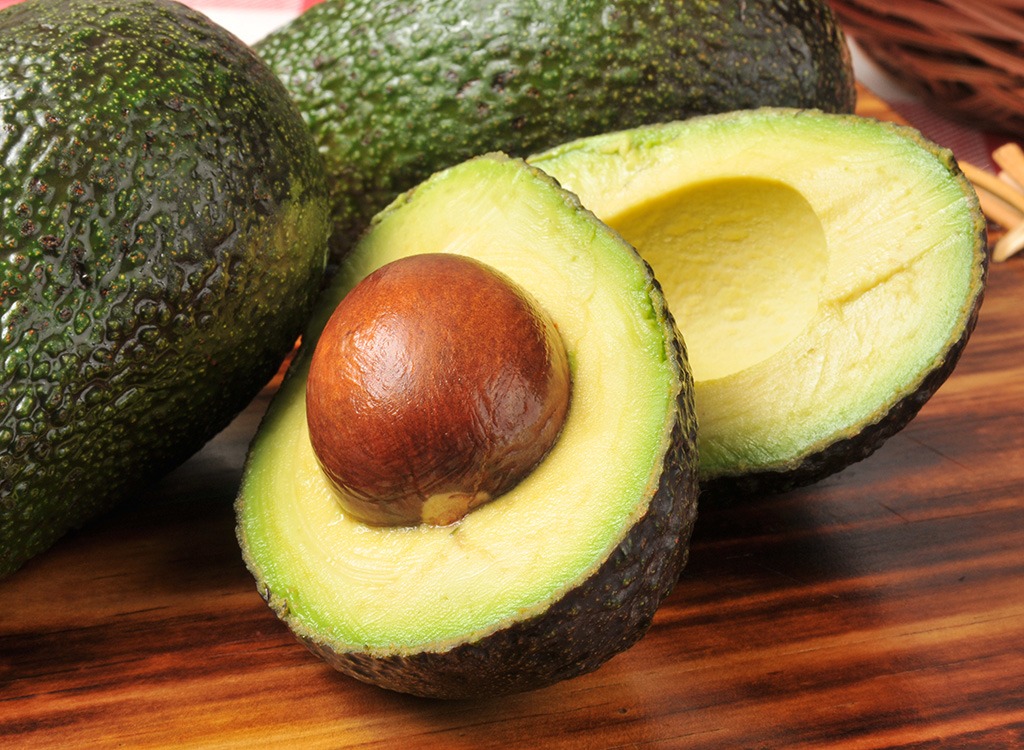
When your mind starts spiraling and demanding a slice (or three) of pizza, ask yourself if you are getting enough healthy fat during each of your three main meals? “Fat helps to satiate and satisfy,” explains Laura Cipullo, RD, CDE, CEDRD, and author of Women’s Health Body Clock Diet. “It slows the absorption of simple carbohydrates and thus keeps you fuller, longer. Fats mixed with proteins and carbs also prevent a roller coaster in blood sugar that would have otherwise caused you to think you were hungry. You weren’t actually hungry, your blood sugar was dropping and you misinterpreted this for the need to eat.”
Check the clock

The next time those voices creep up on you, check what time it is. “If it is the 3 to 4 p.m. hours, recognize this is when your cortisol is slumbering and likely making you feel tired,” says Cipullo. “Instead of reaching for a sugar fix, get sunlight, movement and a snack with either carb and fat or carb and protein; the mixed macronutrient snacks are blood sugar friendly. And the light helps to sync you with nature’s circadian rhythm and the movement helps to increase your feel-good hormones while oxygenating your blood.”
Ask yourself if you’re truly hungry

Your battle often boils down to a simple question: Are you really hungry? “Ask yourself if you would eat a whole plate of broccoli instead of whatever you’re craving,” says Wolfe. “If the answer is no, you’re not really hungry.”
But you do need to figure out why you think you’re hungry. “It’s more likely that you’re experiencing an emotional stressor that’s triggering your thoughts of food and your desire to eat,” offers Dr. Robert G. Silverman, a chiropractic doctor, clinical nutritionist, and diplomate with the American Clinical Board of Nutrition. “Are you tired, upset, depressed, lonely, anxious, in pain? Are you just bored? Simply recognizing that you’re experiencing an emotion lets you shut down that inner eat-junky-food-now voice.”
Find your mantra

Mind over matter sounds cliché, but it can work wonders when trying to get those overbearing voices to stop leading you astray on your diet. Find your mantra; it can be something as simple as “This may be tough, but I’m tougher.” Say that louder than the chatter in your head. “Sometimes, realizing that you’re stronger than you think can be enough to convince yourself to put down that extra slice of pizza,” says York. “Repeating whichever mantra works for you is a good way to show yourself that food isn’t what you’re looking for to be satisfied.” We recommend any of these inspiring yoga mantras.
Weigh the pros and cons

If you’re debating whether or not you should skip the workout or eat those fries, take a few moments and jot down the pros and cons of your choice. “Writing down your thoughts before making a poor decision gives you the opportunity to mindfully consider the consequences of your actions,” explains York. “In other words, ‘If I skip my workout, I’ll probably feel guilty and regret it but if I get it done, I’ll feel great!'” Journaling is one of the fascinating weight loss tricks you haven’t tried that we recommend at Eat This, Not That!
Stimulate both sides of your brain

“Grab a ball or anything that will fit in one hand such as keys, a pen, or a water bottle, and think of that thing that’s causing you anxiety. When you feel that anxiety somewhere in your body, rate it from one to ten,” recommends Drucker. “Pass the ball back and forth, from one hand to the other, crossing the center of your body, so you’re stimulating both hemispheres of the brain. For the quickest results, keep one hand in front of you as the other swings out to the side each time you pass the ball. Do this for one minute. Stop. Take a deep breath. You might notice the anxiety has vanished. This is because by stimulating both sides of the brain, you’re spreading blood and electrical impulses throughout the brain and this floods that cluster of neurons and diffuses it. Now, think of that same thing again and see how much anxiety you can manage to call up, and rate it again on the 10 to 1 scale. Repeat until the anxiety has disappeared.”
Visualize yourself reaching a tough fitness goall

If you have a goal in mind—running a 5k, hiking a mountain, or fitting into an outfit that’s currently too tight—envision yourself accomplishing that goal. “Eating a donut instead of a grapefruit for breakfast may seem rewarding in the moment, but thinking of the long-term goals that are set can usually provide a healthier perspective,” says York. “And anyone knows that running, hiking, or feeling confident in a new outfit is much trickier after eating a donut.”
Cross items of your to-do list
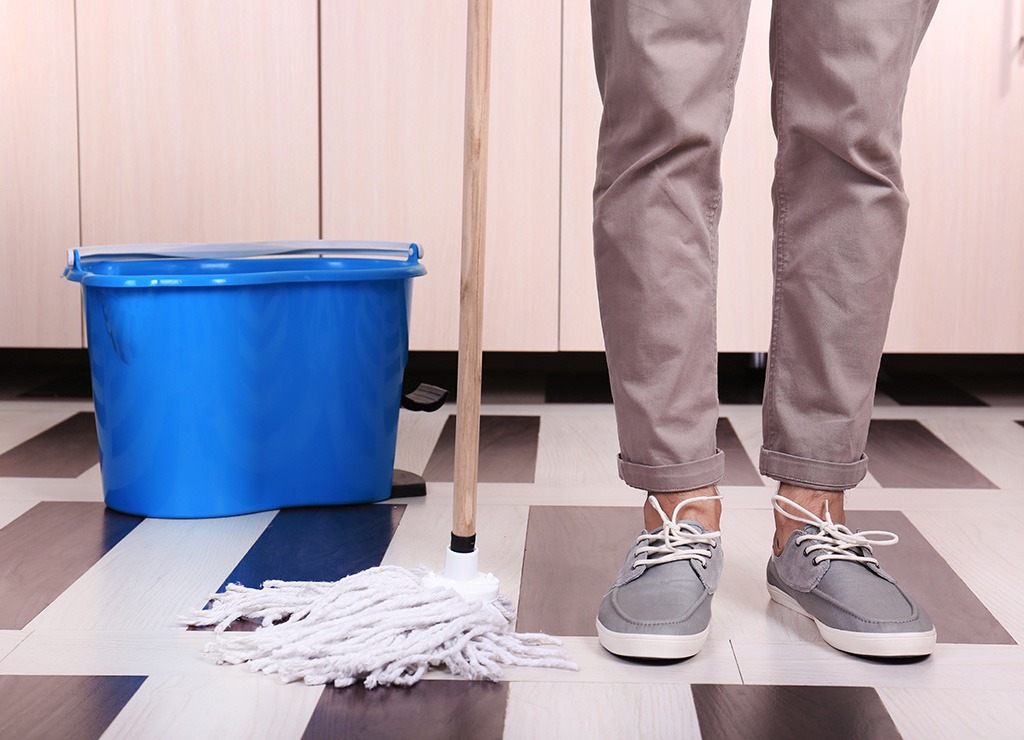
“Quiet the snack chatter in your head by knocking off an item or two from your to-do list,” recommends Wolfe. “Getting stuff accomplished can be as satisfying as snacking.” And it can even burn calories too! We recommend grabbing a garbage bag and then reorganize your pantry for successful weight loss.
Dress like you’re hitting the gym
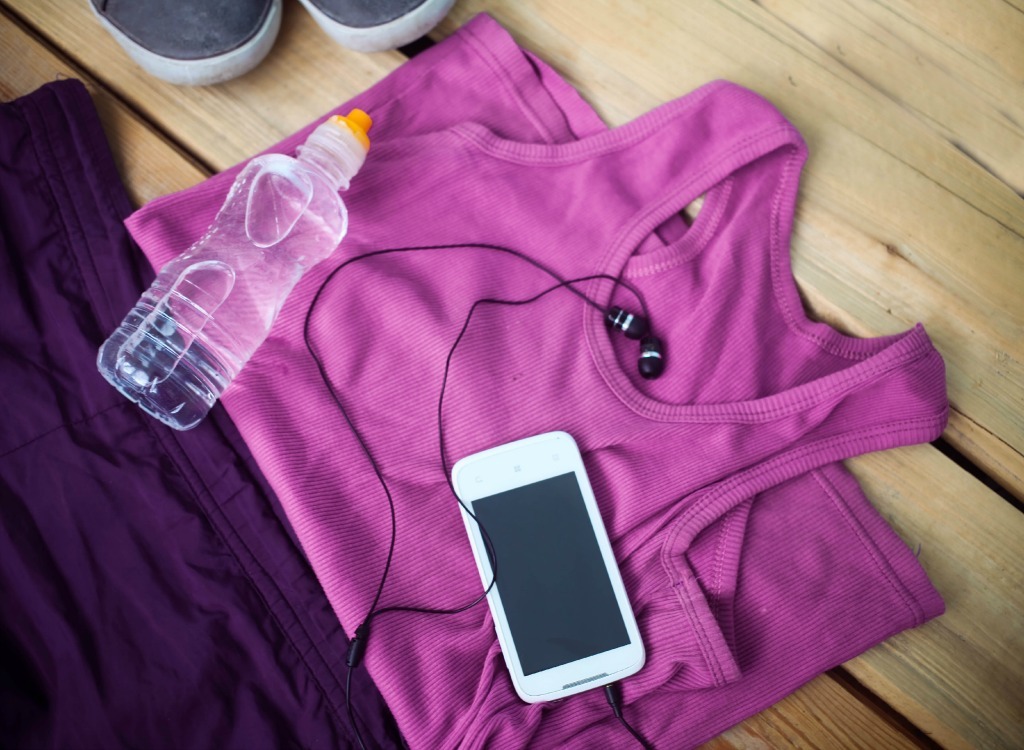
When the chatter is too loud, just put on your workout clothes and lace up your sneakers. “Even if working out seems like too much effort, looking the part can at least reduce the urge to eat,” says York. “Putting on workout gear can create a shift in mindset, and requires leaving the kitchen where most temptation resides.”
Plan your meals ahead of time

Silverman has his patients make it part of their routine to write down and commit to all their meals and snacks for the day—including any treats—in advance. Once it’s written down, there’s no going back. “That way you know exactly what you’ll be eating and when,” he says. “This helps you block out unwanted thoughts about eating.”
Give yourself a break.

We’re human and it’s okay to give yourself a break. In fact, letting yourself have an off day is key to getting your brain to let up on the negative suggestions. “Don’t deprive yourself. It’s okay to take a cheat day once a week,” says Dave Colina, certified CrossFit trainer, Krav Maga instructor and founder of O2 Natural Recovery. “Rewards are important, but in moderation. If you happen to give into the inner chatter, don’t beat yourself up; just learn from it and adjust your habits accordingly.” You can even give yourself a break and still be extra-smart about it with these cheat meal tips for weight loss success.
Additional reporting by Kiersten Hickman.


